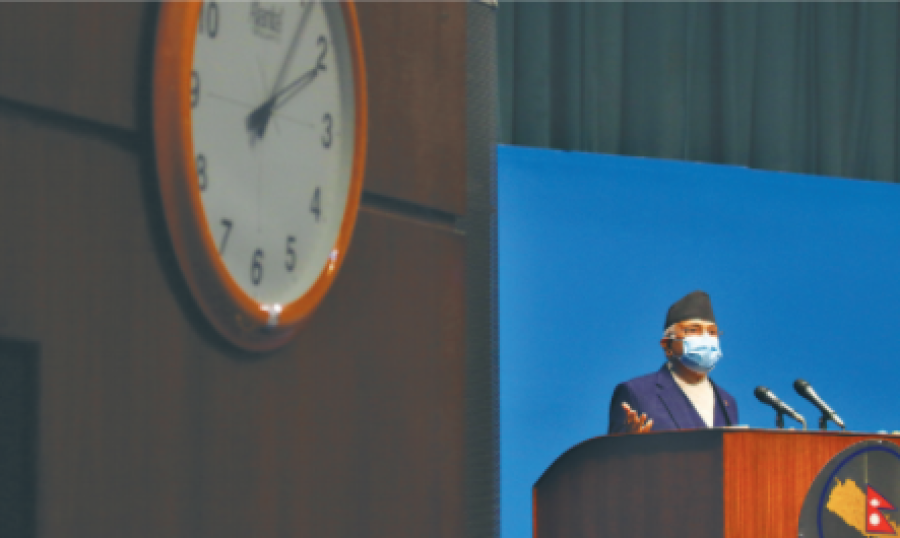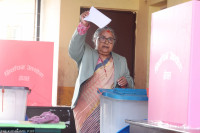Politics
Oli mulling budget through ordinance as his vote of confidence in Parliament remains pending
The federal budget for the next fiscal year must be presented on May 29. Parliament session is yet to be called for presenting policies and programmes and pre-budget discussions.
Anil Giri
The government must present the annual budget on Jestha 15, which falls on May 29 this year, as per a constitutional provision.
KP Sharma Oli was appointed prime minister on May 14 as leader of the largest party–CPN-UML–as per Article 76 (3) of the constitution and therefore must seek a vote of confidence in the House of Representatives within 30 days.
To win a vote of confidence, he will need the support of the Janata Samajbadi Party, the fourth largest party in the lower house.
But as he is yet to get a vote of confidence–and the support of a divided Janata Samajbadi Party is not a given–it is unclear how the annual budget of government’s income and expenditure will be presented.
According to sources privy to the matter, if Prime Minister Oli is able to garner support from the Janata Samajbadi Party, he will summon the House session and present the budget and also seek a vote of confidence; if not the budget will come through an ordinance.
“We will bring the budget first and summon the House later in order to seek a vote of confidence or we can seek a vote of confidence before that too,” Foreign Minister Pradeep Gyawali told the Post.
A Cabinet meeting on Monday was expected to call the budget session of the House but the decision was not made although the matter was discussed in the Cabinet, a minister said after the meeting.
“I am going to seek a vote of confidence soon so that I am planning to call the House session soon,” Oli said at the Cabinet meeting, according to a minister who spoke on condition of anonymity.
Oli believes that if he again fails the floor test, Parliament cannot give another government under Article 76 (5), so there is no option besides bringing the budget through an ordinance, he added.
Article 76 (5) allows any member of the House of Representatives to form a coalition government.
But a budget through an ordinance is unconstitutional, observers say.
“Oli does not have the right to hold back Parliament. He cannot overrule the constitution by not calling the House session as per mandatory provision in the constitution,” said Radheshyam Adhikari, an expert on constitutional affairs and National Assembly lawmaker from the main opposition Nepali Congress.
On May 10, Prime Minister KP Sharma Oli had lost the vote of confidence in the House of Representatives after he could secure only 93 votes as a section of his own party did not attend the vote.
Although there has been a rapprochement between Oli and senior leader Madhav Kumar Nepal since the vote, the UML has only 121 seats in the 275-member lower house and will need the support of a section of the Janata Samajbadi Party to get a majority in the House.
But sources within the section led by Samajbadi Party chair Mahantha Thakur and Rajendra Mahato, whom Oli has been cultivating by agreeing to some of their demands, say that its support to the Oli government is not guaranteed.
“We have made our position clear that we cannot support the government on the pretext of approving the budget because our demands are yet to be fulfilled,” a senior Janata Samajbadi Party leader of the Thakur-Mahato faction told the Post. “The party had forwarded at least half a dozen demands to the government of which very few have been addressed but others are yet to be considered by the government.”
While the Thakur-Mahato faction abstained from the May 10 vote, another faction led by the other party chair Upendra Yadav voted against Oli.
Janata Samajbadi Party has a total of 32 votes in the lower house. The support of the Thakur-Mahato faction of the party would be enough for Oli to secure a majority.
But there are legal issues too. Before presenting the budget, the government has to complete two important procedures–presentation of the government’s annual policies and programmes by the President and holding pre-budget discussions in the House.
“At least 15 days are needed to hold pre-budget discussions,” Rojnath Pandey, secretary at the Parliament Secretariat, told the Post.
Since the government’s annual budget is a political document, a constitutional provision, the government should not escape from it, observers say.
“As per the constitution, the President should read out the policies and programmes in the joint session of the House and there should be pre-budget discussions,” political economist Hari Rokka said. “If someone violates the constitutional provision then it is immoral, unconstitutional and unethical.”
The Oli administration has a history of introducing controversial ordinances despite there being a functioning parliament.
In April last year, he introduced an ordinance, only to be withdrawn later after widespread opposition to it, which would have made it easier for political parties to split. Ironically for Oli, in hindsight, the ordinance only led to the merger of the Rastriya Janata Party Nepal and the Samajbadi Party to form the Janata Samajbadi Party. The fourth-largest party in Parliament is now clearly divided along its two constituent parties.
In December, days before he dissolved the House of Representatives, which the Supreme Court later reinstated calling the dissolution ‘unconstitutional’, Oli amended the Constitutional Council (Functions, Duties and Procedures) Act through an ordinance and recommended dozens of people close to him for several constitutional bodies who were appointed by the President on February 3.
The winter session of the House was summoned on March 7, as per the Supreme Court order, but the ordinance was not tabled to make the amendment into law. Then on May 9, Oli again recommended several names for constitutional bodies based on the same amended Act.
The amendment to the Constitutional Council (Functions, Duties and Procedure) has been challenged in court but the Supreme Court is yet to set a date for its hearing.
As for the presentation of the government’s annual policies and programmes and the budget, the main opposition is unaware if or when the pre-budget discussions will be held.
“We have already told the government and Speaker to call the House for pre-budget discussions,” Bal Krishna Khand, chief whip of the Nepali Congress, told the Post. “But we have not been informed or consulted on when the House session will be called.”
The Parliamentary Secretariat too has completed preparations for a House session
“We have completed all necessary preparations if the government calls a House session, but due to time constraints, we will not be able to hold the pre-budget discussions,” said Pandey, the secretary at the Parliament Secretariat. “To read out the policies and programmes, we can adopt a truncated procedure, but it is next to impossible to hold the pre-budget discussions this time.”
“But if the government is going to present the budget, it should not delay in summoning the House session.”
However, it would not be a surprise if Oli flouted constitutional provisions and brought the annual government budget through an ordinance, say observers.
“Oli doesn’t believe in the rules of the game, he does what he likes,” said Adhikari, the expert on constitutional affairs.




 27.41°C Kathmandu
27.41°C Kathmandu













